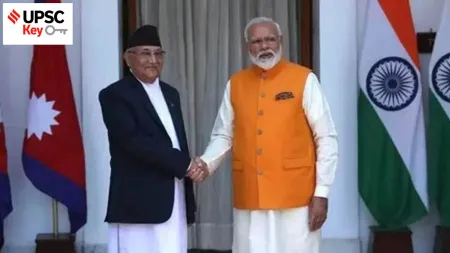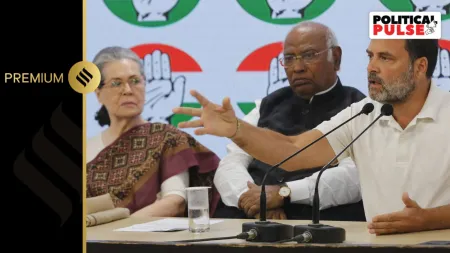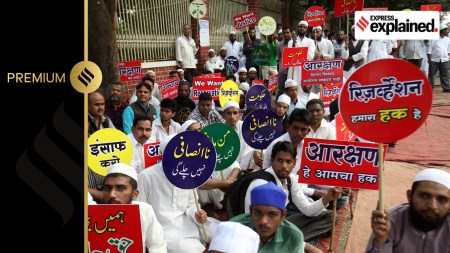- India
- International
Why India must stay the nuclear hand
Revising India’s no-first-use posture, as the BJP is purportedly considering, would be unnecessary and dangerous.
Revising India’s no-first-use posture, as the BJP is purportedly considering, would be unnecessary and dangerous.
The BJP’s election manifesto pledged to “revise and update” India’s nuclear doctrine. Initial reports suggested that rather than just a routine update, a future BJP government might revisit and abandon India’s pledge not to be the first party to use nuclear weapons in a crisis or conflict, otherwise known as a No First Use (NFU) pledge.
The NFU pledge is a cornerstone of India’s nuclear doctrine, formally adopted by the BJP-led NDA government in January 2003. While pledging NFU, and to not threaten the use of nuclear weapons against non-nuclear states (a so-called negative security assurance), the doctrine promises massive retaliation if weapons of mass destruction are used against India or its armed forces. India’s massive retaliation doctrine is strictly designed to deter a nuclear attack. The goal, if crafted properly and if deterrence is successful, is to never to have to fire a nuclear weapon.
In potentially revisiting India’s NFU pledge, the 2014 BJP would be questioning a fundamental tenet of the 2003 BJP’s nuclear doctrine, formulated in large part by the then-national security advisor, Brajesh Mishra. The doctrine has been accepted by successor UPA governments, and the NFU pledge publicly reaffirmed by NSA Shivshankar Menon. It is unclear whether reversing NFU is seriously being considered by the BJP, or whether these are just rumours. Abandoning the NFU pillar of the nuclear doctrine would be a terrible idea for India’s national security. It would potentially transform India’s deterrence-only nuclear doctrine to one of nuclear warfighting, with serious ramifications for Indian security.
First, abandoning NFU is strategically unnecessary for India. Threatening the first use of nuclear weapons is useful for one primary purpose: to deter a conventionally superior adversary, where the threat of using nuclear weapons against conventional forces is necessary to offset the adversary’s conventional advantage over passable terrains.

This is really the only scenario that requires a state to contemplate using nuclear weapons first. But India has conventional superiority against Pakistan, and this gap will only grow in the future as India incorporates more — and more advanced — platforms into its armed forces. India does not need the threat of nuclear weapons — or nuclear warfighting — to deter Pakistani conventional forces from attacking India. India need only deter nuclear use by Pakistan, for which its present assured retaliation doctrine is a powerful and sufficient deterrent.
Some advocates of abandoning NFU point to the fact that Pakistan threatens to use nuclear weapons first against India (precisely because of India’s conventional superiority) and is developing tactical or battlefield nuclear weapons such as the Nasr system to deter Indian army operations across the international border. Therefore, according to former foreign secretary Lalit Mansingh, “There is a feeling within nuclear experts that because of this changed scenario, we need to rethink our response as well.” But since India already reserves the right to retaliate against any nuclear use — whether from Nasr or Shaheen missiles — these developments do not alter the basic deterrent logic or aim of India’s retaliatory doctrine.
How will reversing NFU improve India’s ability to respond to Pakistani development of battlefield nuclear weapons? Against China, India has achieved a greater conventional balance and, in any case, the first use of nuclear weapons against Chinese ground forces in the likely terrain of any conflict renders them futile as a practical deterrent.
Second, not only is abandoning NFU unnecessary, it would make any militarised crisis with Pakistan very dangerous for India. Pakistan does not have a nuclear force guaranteed to survive a first strike from India. This makes the threat of first-use by India much more alarming to Pakistan. In a crisis, absent a formal NFU assurance, Pakistan would have reasons to fear a disarming Indian first strike and begin to calculate that it is in a “use them or lose them” situation, where it is better off striking first before India can wipe out its nuclear forces.
In a mutual first-use world where at least one side worries about the survivability of its forces (as Pakistan might), the overriding incentive by both sides is to “go first”, before the adversary, so that one’s nuclear weapons are not eliminated by an opponent’s first strike. India’s formal NFU pledge is therefore a stabilising firebreak that stays both Pakistan’s and India’s nuclear hands in a crisis.
Third, formally abandoning NFU would carry significant costs and set a dangerous precedent in the second nuclear age in which the world presently finds itself. Having a credible first-use doctrine involves costly development and intensive management procedures for both strategic and tactical nuclear weapons, and would carry risks of inadvertent and unauthorised nuclear use. India has been accepted by the world (and formally by the Nuclear Suppliers Group) as a legitimate and responsible nuclear power. Reversing NFU could provocatively undermine the rightful legitimacy that the NDA and successive UPA governments achieved.
One could retort that the formal NFU pledge is just words — words that Pakistan and China may not even believe. But these words signal intent, and declaratory nuclear doctrine is an important and valuable window into a nation’s intentions on when and under what conditions it might be thinking the unthinkable.
For example, it is certainly worth re-evaluating whether “massive retaliation” is an appropriate doctrine, as opposed to simply “assured” or “certain” retaliation, which is both more credible and better achieves India’s deterrent objectives.
India’s security situation is such that its nuclear forces are primarily required to deter nuclear use and coercion against it, demanding only a doctrine of credible and assured retaliation — this is difficult enough to manage, and aligning India’s nuclear posture with that doctrine is something that both the NDA and UPA governments have admirably worked hard to achieve.
The formulators of India’s doctrine in the first NDA governments — K. Subrahmanyam and Brajesh Mishra for example — understood this and made NFU a pillar of India’s nuclear posture. Those who may be thinking of revising the NFU pledge should remember why they did so, and recognise that no changes in the geostrategic landscape necessitate abandoning NFU.
One hopes that lucid strategic sense prevails and that future governments focus on further enhancing the credibility and reliability of India’s retaliatory deterrent nuclear doctrine and posture, rather than dangerously trying to abandon it.
The writer is assistant professor, MIT, US.
EXPRESS OPINION
More Explained
May 10: Latest News
- 01
- 02
- 03
- 04
- 05








































